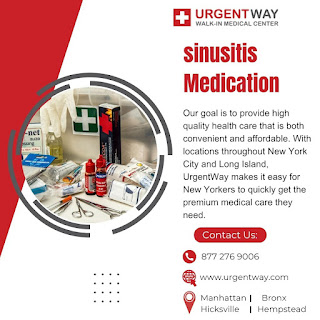How do I know if my sinusitis medication is working?
How do I know if my sinusitis medication is working?
Introduction:Often called a
sinus infection, sinusitis can be uncomfortable and frustrating because of
symptoms like pressure, facial pain, and congestion in the nose. When given
treatment for sinusitis, you may ask yourself, "How do I know if my
sinusitis medication is working?" Monitoring your development is crucial
to assessing the efficacy of the treatment, therefore this is a legitimate
worry. This post will discuss how to tell if your medication is helping, what
factors can affect how well it works, and what to do if you don't see any
change.
It's critical
to comprehend the many sinusitis treatment options before assessing how well
your medication is working:
Antibiotics: Used to treat sinusitis caused by bacteria. These target
and eradicate infections caused by bacteria.
Reduce swelling and clear obstructed nasal passages with nasal decongestants.
Antihistamines: By lowering histamine reactivity, they help manage nasal
problems brought on by allergies.
Corticosteroids: Reduce nasal passage edema and inflammation.
Pain Relievers: Reduce symptoms including facial pain and headaches.
Use saline nasal sprays to maintain clear mucus and moist nasal passages.
Whether you have bacterial, viral, chronic, or acute sinusitis will determine
the kind of treatment you are prescribed.
Indications
That Your Sinusitis Drug Is Effective
It's important to keep an eye on your sinusitis symptoms when you begin a
treatment plan. The following are the main indicators that your treatment is
effective: c
1. Less congestion in the nose
A decrease in nasal congestion is an obvious indication that your sinusitis
medicine is working. Your ability to breathe through your nose should improve
as the inflammation goes down.
2. Reduced Pressure and Pain in the Face
Pain and pressure around the eyes, cheekbones, and forehead are common symptoms
of sinusitis. This soreness will be gradually lessened by effective treatment.
3. Increased
Vitality
You may have weariness as a result of sinus infections. As your body heals, you
should feel more energized if your medication is effective.
4. Less Severity of Headaches
As the drug lessens swelling and unclogs obstructions, sinus headaches brought
on by pressure accumulation in the nasal passages should go away.
5. Reduced Production of Mucus
Reduced mucus production is frequently the outcome of effective sinusitis
treatment. Additionally, mucus may get thinner and clearer, which would mean
the infection is getting better.
6. Restoring
Taste and Smell
Your perception of taste and smell might be affected by sinus infections. These
sensations may gradually return to normal when the drug takes effect.
7. Reduced Fever
If you have a fever along with your sinusitis, a drop in temperature may mean
the medication is working to treat the infection.
How long does it take for medication to start working for sinusitis?
The type of sinusitis and the medicine used determine how long it will take
for symptoms to improve:
Medicines: Within three to five days of a diagnosis of bacterial
sinusitis, medicines typically start to work.
Although they offer comfort in a matter of hours, nasal decongestants are not a
permanent fix.
It may take a
few days for corticosteroids to start to make a noticeable difference in
inflammation.
Antihistamines: They may take a few days to fully reduce symptoms
associated with allergies.
Saline sprays can relieve dryness right away, but it might take a few days for
the mucus to clear.
A lengthier course of treatment may be needed for chronic sinusitis, and other
measures like lifestyle modifications or surgery may be required.
Factors Influencing the Efficiency of Medicine for Sinusitis
How effectively your sinusitis treatment works depends on a number of factors:
1. Accurate Diagnosis
Allergies, viruses, and bacteria can all cause sinusitis. A precise diagnosis
is essential to the success of your treatment. For instance, viral sinusitis
cannot be treated with antibiotics.
2. Compliance
with Recommended Therapy
It's crucial to take your prescription as prescribed by your physician. Recovery
may be hampered by skipping doses or discontinuing treatment too soon.
3. Fundamental Medical Conditions
Your medication's effectiveness may be impacted by conditions such as nasal
polyps, asthma, or allergies.
4. The infection's severity
Longer treatment durations and other interventions can be necessary for severe
or persistent sinusitis.
5. Environmental
Elements
Recovery may be slowed by exposure to allergies, pollution, or dry air.
Avoiding irritants or using a humidifier can be beneficial.
Sinus
Infection doctor At UrgentWay Walk-In Clinic
Sinusinfection treatment is available at all UrgentWay locations. We are open seven
days a week from morning to evening, giving you the freedom to visit us
whenever it is convenient.
Our
experienced providers will assess your condition, advise the best sinus
infection treatment accordingly and counsel you on preventative care.
Conclusion
Monitoring your symptoms, following your treatment plan, and taking care of any
underlying issues that might be impeding your recovery are all necessary to
determine whether your sinusitis medicine is effective. You can get rid of
sinusitis and reduce your chance of getting sick again with the correct
medicine and preventative care. Never be afraid to seek advice from a healthcare
expert if you have questions regarding your development. You can successfully
manage sinusitis and return to feeling your best by recognizing the symptoms of
improvement and taking the required actions to maximize your therapy.




Comments
Post a Comment